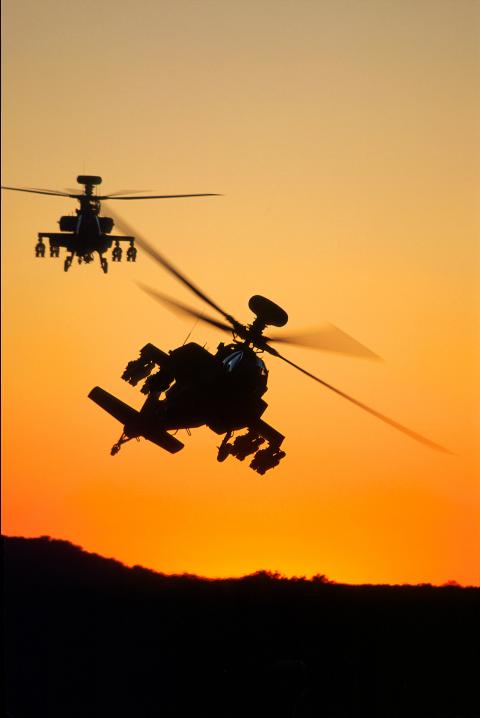The Taiwanese army earlier this year took delivery of the first of 30 Apache combat helicopters from the US and next month pilots and crew will begin training on the platform, which recently received a new designation from the US Army.
As a result of the significant upgrades made to the AH-64D Block III Apache during its development, the US Army recently decided to re-designate it the E model. To date, 25 AH-64Es have been delivered to the US Army and Taiwan received its first delivery during a low-key handover ceremony at Boeing Co’s Mesa facilities in Arizona in May.
According to Aviation Week, training for Taiwanese pilots and crews is expected to begin next month.

Photo courtesy of Boeing Co.
Following approval by the US government in August of contracts for full production of the helicopter, Boeing is now building four AH-64Es per month for the US Army, which plans to buy a total of 690, and three for foreign military sales (FMS). The US has also notified Congress for the sale of eight AH-64Es to Indonesia, 22 to Qatar and 22 to India, the latter under a non-FMS “hybrid” agreement.
If tests at the Naval Air Station China Lake in California last year are any indication, Taiwan’s AH-64E will be a far more formidable combat helicopter than its predecessors. During the drills, the E model reportedly countered realistic air defense threats and was able to maintain its position, unlike the Block II Apaches, which was “shot down” in similar exercises.
“The Block III absolutely frustrated these folks that operate these [air defense] systems,” Colonel John Lynch, attack helicopter manager at Army Training and Doctrine Command, told Aviation Week.
This was partly due to the aircraft’s ability to operate at lower altitudes and thus evade radar systems arrayed against it.
Part of the Echo model’s advantages are its improved composite main rotor blades, which are 15cm longer than those used on older models, as well as a new tip design and General Electric T700-GE-701D engines, all of which give the aircraft improved aerodynamic performance.
The AH-64Es’ new power-to-weight ratio also makes it safer for operations at low-levels and gives it a performance similar to that of the AH-64A, which was significantly lighter than the AH-64D Block II model, Lynch told Shephard Media, a defense and aerospace publication.
Taiwan’s 30 Apache helicopters, administered under a program named “Sky Eagle,” were included in an October 2008 notification to US Congress for about US$2.5 billion. Full delivery of the multirole attack helicopters is expected to be completed in 2017.

Alain Robert, known as the "French Spider-Man," praised Alex Honnold as exceptionally well-prepared after the US climber completed a free solo ascent of Taipei 101 yesterday. Robert said Honnold's ascent of the 508m-tall skyscraper in just more than one-and-a-half hours without using safety ropes or equipment was a remarkable achievement. "This is my life," he said in an interview conducted in French, adding that he liked the feeling of being "on the edge of danger." The 63-year-old Frenchman climbed Taipei 101 using ropes in December 2004, taking about four hours to reach the top. On a one-to-10 scale of difficulty, Robert said Taipei 101

A preclearance service to facilitate entry for people traveling to select airports in Japan would be available from Thursday next week to Feb. 25 at Taiwan Taoyuan International Airport, Taoyuan International Airport Corp (TIAC) said on Tuesday. The service was first made available to Taiwanese travelers throughout the winter vacation of 2024 and during the Lunar New Year holiday. In addition to flights to the Japanese cities of Hakodate, Asahikawa, Akita, Sendai, Niigata, Okayama, Takamatsu, Kumamoto and Kagoshima, the service would be available to travelers to Kobe and Oita. The service can be accessed by passengers of 15 flight routes operated by

Taiwanese and US defense groups are collaborating to introduce deployable, semi-autonomous manufacturing systems for drones and components in a boost to the nation’s supply chain resilience. Taiwan’s G-Tech Optroelectronics Corp subsidiary GTOC and the US’ Aerkomm Inc on Friday announced an agreement with fellow US-based Firestorm Lab to adopt the latter’s xCell, a technology featuring 3D printers fitted in 6.1m container units. The systems enable aerial platforms and parts to be produced in high volumes from dispersed nodes capable of rapid redeployment, to minimize the risk of enemy strikes and to meet field requirements, they said. Firestorm chief technology officer Ian Muceus said

MORE FALL: An investigation into one of Xi’s key cronies, part of a broader ‘anti-corruption’ drive, indicates that he might have a deep distrust in the military, an expert said China’s latest military purge underscores systemic risks in its shift from collective leadership to sole rule under Chinese President Xi Jinping (習近平), and could disrupt its chain of command and military capabilities, a national security official said yesterday. If decisionmaking within the Chinese Communist Party has become “irrational” under one-man rule, the Taiwan Strait and the regional situation must be approached with extreme caution, given unforeseen risks, they added. The anonymous official made the remarks as China’s Central Military Commission Vice Chairman Zhang Youxia (張又俠) and Joint Staff Department Chief of Staff Liu Zhenli (劉振立) were reportedly being investigated for suspected “serious